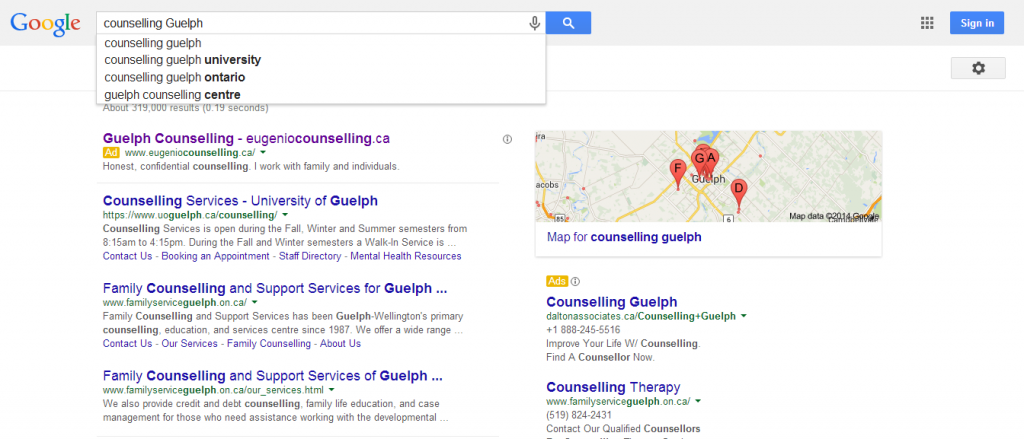The very first step in search engine optimization is always keyword research. It is not advisable to start SEO without having done a proper analysis of the keywords we want to target. Running an SEO campaign without keyword research is like driving a car with your eyes closed.
Keywords are our targets, without target we have no control and no way of knowing where are we going and if we are getting there any time soon. Proper keyword research requires more than knowing the company’s name and products, it requires understanding of searching behaviors and patterns.
To have the ability to adjust what we are planning for our ranking in terms of results is a very efficient way of doing your marketing online. The big question becomes, how to choose the right keywords for your search engine optimization campaign?
For example, if we search for Guelph counselling we get slightly different results than searching counselling Guelph. In keyword search, the order in which the words appear in the phrase does matter, each can yield very different search results but more importantly, one is more used by searchers than the other and it is our job to figure that out. One term is used more by people seeking the University of Guelph counselling department and the other is used more by people interested in seeking therapy or actual counselling services, the key if figuring out which is which. We get and idea looking at the following image:

How to find the maximum benefit keywords
It is possible that if we have a surf shop in Costa Rica we would be tempted to focus our efforts in the keyword “surf shop”. However, if our main services are surfing lessons or surfing trips or tours in Costa Rica, we may want to focus our work towards promoting the service rather than the category of business we are. The possible combinations of keywords may be quite large, the ways that people search for our specific surfing or tour services may depend on many factors, so we need to consider them all and use them to create the long list of keyword candidates.
This is where we make up keyphrases that combine the services, the location and the industry terms and our list should include keywords/phrases we must then review for the following parameters:
- potential traffic
- conversion levels
- level of competition
- estimated benefit
We should choose the best keywords based on every aspect but more importantly, estimated benefit. This is where the return on investment comes into play. As we very likely have finite budget, our biggest ranking efforts should focus on the keyphrases with the highest benefit and possible ROI with a proper balance of potential traffic and competition.
If we choose a keyword that has high levels of competition, it will require more effort (and budget) to rank in the first page, therefore, we need to consider how much we potentially need to invest (in time or money) before starting the campaign so that the estimated benefit actually more than makes up for the cost of obtaining the result. The formula would be as follows:
estimated benefit - estimated cost to rank = maximum potential benefit
This calculation will give us the maximum potential benefit value and that value is easy to read, the higher, the better.
Using keyword tools like Google’s Keyword Planner it is possible to obtain the level of competition and the estimated monthly traffic, which in turn are used to get the estimated cost to rank.
Ideally we want keywords that have a medium to low level of competition with the highest amount of potential monthly traffic as this would give us the lowest cost and possibly the highest return.

